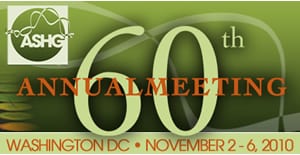
By Kim Barnholt and Amy Kiefer
It’s an exciting week for 23andMe! A number of our research scientists have headed to Washington, D.C. to showcase some of our research discoveries at the annual meeting of the American Society of Human Genetics (ASHG). ASHG is the primary professional membership organization for human geneticists worldwide, including 8,000 researchers, academicians, clinicians, genetic counselors, nurses, and industry professionals. This conference is one of the largest gatherings of human genetics specialists in the world and features a packed schedule of presentations, poster sessions, and exhibits during the November 2-6 event.
A few highlights from 23andMe’s conference presentations:
- With our cohort of over 3500 Parkinson’s patients and 20,000 controls, we replicate five known genetic markers for Parkinson’s disease and identify four novel associations with variants not previously known to be linked to the disease.
- Demonstrating the power of our unique web-based approach to research, we replicate more than 100 known associations for more than 65 medical conditions, including type 2 diabetes, prostate cancer, and multiple sclerosis.
- We report on previously unknown associations for genetic variants that influence hair color, hair curl, and yes, hair loss.
- We report a robust new association between mumps susceptibility and a variant in the FUT2 gene which is also known to influence susceptibility to norovirus, the so-called Cruise Ship Virus.
We are excited to share our progress with you, and we plan to add more 23andMe reports as we move these discoveries through the scientific publication process. We are proud that our research efforts end not only in articles for the academic community, but also in the return of our findings to you, our participants, in the form of new 23andMe reports.
We believe that the results we are presenting this week demonstrate the enormous value and power of our research approach. If you have not already participated, now is a great time to take a survey or complete some research snippets. If you have already contributed, thank you, and please keep up the good work!



